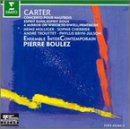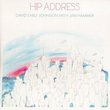| All Artists: Carter, Boulez, Holliger Title: Oboe Concerto Members Wishing: 0 Total Copies: 0 Label: Elektra / Wea Release Date: 4/28/1992 Genres: Pop, Classical Styles: Vocal Pop, Opera & Classical Vocal, Chamber Music, Forms & Genres, Concertos, Instruments, Reeds & Winds Number of Discs: 1 SwapaCD Credits: 1 UPC: 022924536427 |
Search - Carter, Boulez, Holliger :: Oboe Concerto
 | Carter, Boulez, Holliger Oboe Concerto Genres: Pop, Classical |
Larger Image |
CD DetailsSimilar CDs
|
CD ReviewsOne of the best Carter collections around, but seek out the Christopher Culver | 01/18/2007 (5 out of 5 stars) "This disc contains four pieces by Elliott Carter in performance by the Ensemble Intercontemporain conducted by Pierre Boulez. The music here shows the kinder, gentler Carter who arose in the late 1970's, and though his writing is still biting and modernistic, there's an economy of means and a greater sweetness than his earlier mature work. However, instead of the original 1992 Erato release that this listing describes, one would do better to seek out the reissue in Warner's budget line Apex.
The "Oboe Concerto" (1986) was written for Heinz Holliger, who performs here. Like in his piano concerto of twenty years before, Carter doesn't make this a simple conversation between soloist and orchestra; instead, the chamber orchestra is divided into two groups, one being oboe, violas, and percussion I, the other being flute, clarinet, horn and trombline, violins, cellos, basses, and percussion II. Each of the two orchestral groups uses different harmonic intervals and, since Carter's "gimmick" is polyrhythms, different divisions of the beat. But unlike the piano concerto, there's no fatal conflict here, the soloist never commits "suicide by orchestra". Instead, the differences between each part of the ensemble merely serve to keep up an entertaining flow of action. The virtuosity of the oboe part comes in its many long, sustained lines, which Holliger told Carter are more difficult to perform than short bursts. I find this a great improvement on Carter's earlier concertos and return to it often. "Esprit Rude/Esprit Doux" for flute and clarinet (1984) was written for the sixtieth anniversary of Pierre Boulez. Though its title is also an obscure reference to Classical Greek, the piece really is built on a contrast of rough and smooth sounds. This is a fun piece, especially in the scorrevole passages, and the way the two instruments constantly dart around each other is delightful. "A Mirror on which to Dwell" (1976) is a setting of six poems by Elizabeth Bishop for chamber orchestra and soprano, here Phyllis Bryn-Julson. The six movements range over an immense range of emotions and techniques, but unfortunately there's not enough room here for much specific treatment. However, in general this cycle of one of Carter's most elegant pieces, and though I often prefer purely instrumental music to vocal, "A Mirror on which to Dwell" is certainly the most awesome piece on the disc for me. What is most striking is how Carter, a composer who many see as obtuse and too removed from everyday life, is here able to accurately mirror such feelings as waking to a beautiful morning or the very moment of falling out of love with someone. "Penthode" for five groups of four instruments (1984-1985) is an unusually tranquil piece in Carter's oeuvre. David Schiff singles it out for its "lack of anxiety". Written for a programme with Boulez' "Repons", this nineteen-minute work of Carter's approximates the total abstraction and interest in pure colour of the great Frenchman. "Penthode" supposedly takes inspiration from North Indian Dhrupad music Carter discovered in the early sixties, but the listener can just enjoy it as a lovely stream of timbres, bubbling in different rhythms. The performances here are all very satisying, as is common with the Ensemble Contemporain's efforts. And as they were recorded in the projection space at IRCAM, the sound is of the highest quality. However, the liner notes are meagre; I'd recommend seeking out David Schiff's THE MUSIC OF ELLIOTT CARTER (second ed. 1998). If you can buy this CD in a location where it really costs budget price, this is a fine introduction to the music of Elliott Carter. Those in the U.S., however, might want instead to find instead the Deutsche Grammophon disc with the "Clarinet Concerto" and "Symphonia: Sum fluxae pretium spei", for recent Carter, or the Ars Nova budget disc with the "Piano Concerto", the height of bad-boy 1960s Carter. Needless to say, fans of the great American composer should pick this up sooner rather than later." |




